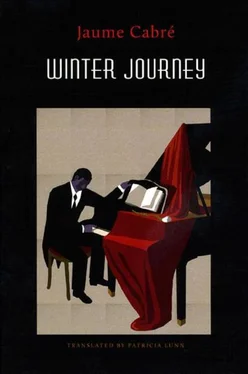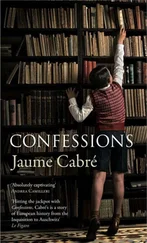They were years filled with frenetic activity in the adjoining school, studying violin, languages, typing, cryptography and history, so as not to leave any space in his head for remembering. When he turned seventeen, he had to give up his place in the Center to someone who needed it more. Among the options offered to him, he chose to go and work on the Ain Jarod kibbutz. When he got there he thought they would give him a hoe, but after two days of training, the first tool they gave him was a rifle to hold in one hand and three rounds of ammunition for the other. Touching the metal part of the rifle reminded him of the Luger that his poor father, Dr. Lodzer, had put into his hands after kissing him for the last time. But he didn't say anything because it seemed that at the kibbutz they trusted him with their defense. He just stood there open-mouthed with the rifle and the ammunition, and a black-haired girl came up to him with a blanket, smiling, and said, This blanket is your skin, Itshak. It'll be your only company while you're on watch. And her jet eyes were beautiful, she was named Hannah, she was in charge of supplies and was on watch that night too. And he thought it was unfair to be as ugly and shy as he was, and to have to wear thick glasses, and he didn't know how to thank her. Only after she'd moved away, handing out blankets and smiles, did he say softly, Sorry, sorry. And he looked around to see if anyone had heard. And now he'd coughed in the guard post and given away his position to possible enemies. He tried to pierce the darkness with his weak vision so as to see the flash before anyone else. Then he heard a soft, sweet swish by his ear and after it the monstrous explosion of a shot. He found himself on the ground, sitting up, and breathlessly felt his ear. A warm, sticky liquid. And he was trembling, making no sense of the cries of his companions who came rushing from the guard post. The skirmish lasted for five minutes in an infernal exchange of shots, and he didn't move, rigid, inside himself, reliving the cold dark room of Treblinka. They had to pull him, rigid, in a sitting position, from the hole he was in, and the next day they sent him back with a recommendation that he spend some time in the psychiatric hospital in Tel Aviv. They never told him how many deaths had been caused by his cough in that nighttime skirmish in Ain Jarod.
When after three years they let him live by himself again, he moved to the coastal town of Dor, fifty kilometers north of Tel Aviv, convinced that the view of the sea, the fishermen at work and the few, small vessels going in and out of the oily port would distract him from his lacerating thoughts. The Tzahal once more considered him capable of service to a country that could allow no hands to be idle, especially if they were expert at uncovering the secrets of even the most innocent texts. His medical history and his weak vision had taken him out of the line of fire, but they shut him in a windowless room in Tel Aviv to decipher, like a cryptographer, all of the messages sent or intercepted around the world by the commandos who had just captured Eichmann in Buenos Aires. ltshak attended all the sessions of the trial in the front row, looking at the canary in his glass cage, observing him closely with his tired eyes, examining him almost without attending to the laconic answers to the tribunal's questions and letting his cough echo in his memory as many times as possible until it no longer hurt him. And he breathed easier when they executed Adolf Eichmann, as if he were the torturing Hauptfi hrer of Treblinka. But he still didn't have the heart to visit the crypt of Yad va-Shem, because there was no therapy that could erase his fragment of Shoah from his memory, of the night when his father woke him up and whispered in his ear, You're a very brave boy, ltshak, you're a man because you're nine years old. And wideeyed he looked at his father and behind him his mother, smiling in sorrow with Edith, no longer feverish and finally sleeping peacefully, in her arms, and Grandfather reciting another silent ekah, and being grown up made him very afraid. And his father told him, Don't worry, because we'll all live inside you. Because you're strong, you'll live and be our eyes and our memory, my son. ltshak had gone over his parents' terrible reasoning hundreds of times: to whom, oh God, to whom do we give the opportunity to escape from Hell; who must be our Orpheus? Miriam offered herself immediately in favor of anyone else, as did Josef, and they were both thinking of the children. Old Moishe held out his hands, offering to their service what little life was left to him. And then it was clear that deciding which child had to die was the most terrible of all. Miriam couldn't understand how there could be so much evil in the world; Josef, cloaked in the coolness he'd learned to cultivate as a doctor, reasoned his way from either of them, it doesn't matter, to a decision, refusing to accept that one child should be condemned by a throw of the dice, and insisting on their right to choose, and, without knowing why, he said, ltshak will live. And Miriam heard, Edith will die.
The decision was followed by a holy silence. Then Josef woke ltshak and told him that now he was a nine-year-old man. And the whole family embraced in the darkness and from that moment on ltshak had trouble sleeping at night.
During the Six Day War he was part of the reconnaissance team under the general staff on the Golan Heights. At that time he was acting as a member of the Department of Cryptography. He worked well and tried to assume the coolness affected by his father in the most difficult moments. But he couldn't pull it off, and he realized that at thirty-three (my mother's age when 1 killed her) he was a very weak man. He wanted to leave himself far behind, and he thought that if he moved to America or Australia, everything would be easier. After returning to Dor to put his obsessions in order by looking at the sea, the dwindling number of fishermen and the ships that passed by on the way to the port of Haifa, leaving the town in a kind of insuperable lethargy, he decided that he had to leave Israel. Twice he put his name on the emigration list, but both times his father's voice made him desist. The soft voice of his father who, once the SS had shut the door and opened the little window to observe them in safety, stood up, acting as if the whole thing were a joke, and went towards the pistol they'd left by the door. And I kept saying, Father, no, no, no, no. I won't be able to do it. And he, You have to; that's the condition for staying alive. And he pointed at the door; in Yiddish, so the people on the other side couldn't understand, he said that what the dogs wanted was for him to be a coward, because then they'd kill them all with no excuses. And 1: No, Father, in that case, 1'd rather die. You kill us. And Father embraced me with all the love there could be in the world and whispered in my ear, I'll help you, my love. Neither of them thought that they were completing another terrible circle, which opened the day that Almighty God, in spite of the Alliance, ordered Abraham, so as to test him, to sacrifice his son ltshak on the hills of Moria, and which was closing in a cold, wet, dark room in the hell of Treblinka when evil decided that ltshak Lodzer was to sacrifice his father, mother, sister and grandfather, also to test him. Doctor Josef Lodzer put the pistol in his son's hand delicately, as if it were a scalpel. It was too big for him, but the doctor covered his hand with his own, as if the whole thing were a joke, and with horrifying assurance and coldness, he led ltshak to where his mother and Edith, still asleep, were lying. And Miriam sent a big kiss to her husband and to ltshak, her executioner, and she embraced Edith, who died without knowing that she was taking part in a game observed with interest on the other side of the door by two junior officers, a captain and a bald doctor. The bullet that killed Edith wounded Miriam badly, and then Dr. Lodzer didn't hesitate and made the pistol held by ltshak point at Miriam, and told her, 1 love you, darling, and the second shot sounded in the cold room. Grandfather lowered his head, almost touching his forehead to the ground, offering his neck with the resignation shown by the lamb offered in the ritual sacrifice, and everything in him blew up with the third shot. And Father told me, ltshak, my son, you will survive; you will live for us; you will be our eyes and our memory. Go to Palestine, put down roots, and we'll all live in Israel through you. Get married and have children and we'll all live through you. And he took Itshak's hand and put the pistol in his mouth and smiled at him as if to say, See? It's just a game. And he pulled the trigger accompanied by ltshak's dead hand, as he had done the other times. And ltshak with the Luger in his hand was incapable of thinking that now he could kill himself because at the age of nine it's impossible to think about nothingness. And the jailers came into the room smiling victoriously, and the bald doctor explained to the others that they'd just observed the defensive behavior typical of the inferior races, who were capable of the most horrible crimes in order to survive, like killing their own children and parents instead of facing the nobility of suicide. And he took the pistol that ltshak still had in his hand, ruffled the boy's hair affectionately and told him, Nothing's going to happen to you, you're going to live in the infirmary block and every once in a while you and 1 are going to have a little talk. And he signaled to the soldiers behind him to take him away. ltshak hardly had time to see Edith and his mother and father and grandfather for the last time. The bitter cold outside made him wake up and realize that he'd committed a terrible crime and, though they were in Treblinka because of his cough, it was his wickedness that had made him commit those murders. This idea was corroborated by the bald doctor, who had become my friend and explained to me that 1 was a wicked child because 1'd killed my whole family to save myself, and observed my perplexed silences with infinite patience, took abundant notes in my presence and gave me candies because he was my friend. And he asked me what 1 was thinking and what 1 was dreaming. 1 don't know what 1 told him, but 1 never explained about the cough. And one day my friend the bald doctor disappeared without saying anything, and two hours later the Red Army came into Treblinka.
Читать дальше












